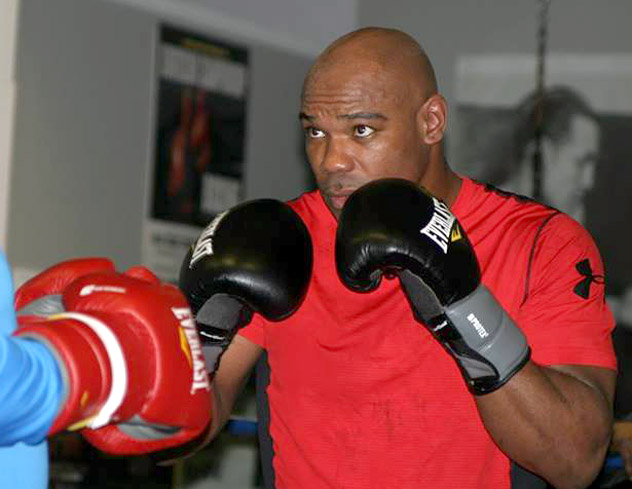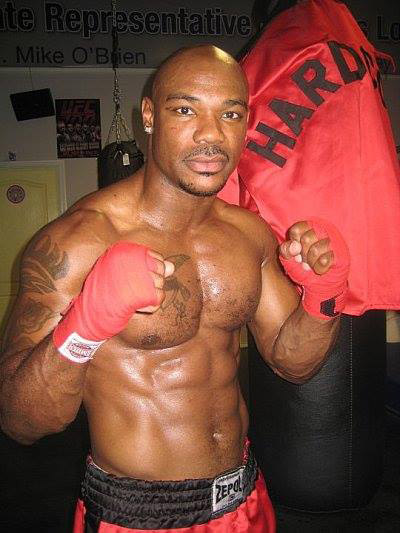Amir Mansour says it’s do or die against Steve Cunningham


Photos by Jim Lindsey/Studio 9 Promotions
PHILADELPHIA — He’s so relaxed. So smooth. He’s been through so much that it’s hard to believe, looking at Amir Mansour, that the two cuts on his face, one high on his right cheek, the other at the corner of his right eyebrow, came from a car accident and slippery church shoes. It’s hard to believe that he’s 41, with a chiseled physique that belies his age. And that his ability to knock people out, he says, comes from his mother.
Words spill from his mouth in verbose, eloquent passages.
But as he unfolds his past, each incident lands with a thud: At 10, he was dealing drugs. At 12, he was barely able to see over the wheel in high-speed car chases. At 17, he was incarcerated for the first time. He eventually did three prison stints for drugs and learned one valuable lesson in 16 years and eight months in the can — that he doesn’t want to go back.
That realization came to him in a glaring epiphany as he sat in a 10-by-10 cell with a shank in his hand, about to kill someone.
But he doesn’t dwell on the past. He doesn’t stew over missed opportunities. The power-punching Mansour is determined to live in the present.
And the present will not get any grander than his meeting this Friday with Steve “USS” Cunningham (26-6, 12 knockouts) in a 10-round heavyweight main attraction on NBC Sports Network’s Fight Night at Temple University’s Liacouras Center, promoted by Main Events. The co-feature will be a 10-round middleweight matchup between Curtis “Showtime” Stevens (26-4, 19 KOs) and Tureano Johnson (14-0, 10 KOs).
 Mansour’s story is far from unique in boxing. What is distinctive is that Mansour (20-0, 15 KOs) is trying to make something out of boxing at 41. Look at his ledger and it has one of those “dubious gaps.” Nine years, to be exact, from June 1, 2001, to August 27, 2010. That was his last stay.
Mansour’s story is far from unique in boxing. What is distinctive is that Mansour (20-0, 15 KOs) is trying to make something out of boxing at 41. Look at his ledger and it has one of those “dubious gaps.” Nine years, to be exact, from June 1, 2001, to August 27, 2010. That was his last stay.
“It’s why I keep looking ahead, and why your rearview mirror is so tiny and your windshield is so large,” Mansour said. “I don’t make excuses. What I did was wrong. But it took me three stays to get it right. Rock bottom for me was one time in a cell with this guy. Just me and him. He had a blade and I had a blade. Someone was going to get ready to die, when we decided to have a mutual truce. He backed off and then I backed off.
“But I was so angry at myself that I was in this type of situation, and how far down I was. I had to live like this, like an animal. That was my rock bottom about six years into my third stint. If I took his life, I was done. If he took my life, I was done. No one was going to win. It’s when you have to live like that, with cans on your cell doors because guys would get bum-rushed when they’re asleep, that you wise up.”
Mansour makes it hard to believe he was guilty of anything, when you blend the person he was with who he is today. He first started boxing during his first stay in prison. He was always good with his hands, an ability he feels he got from his mother, Jacqueline Moorer, of all people. During his last prison stay, Mansour even ran into someone that his mother had actually knocked out. He asked Mansour if “Pudding” (her nickname), was his mom.
His trainer, Philly’s legendary Moses Robinson, says Mansour has the kind of organic power of a young Mike Tyson.
“Boxing is like legal crime to me,” Mansour said. “Maybe this is my release, when I think about it, all the situations and the guys I left behind [in prison]. It’s heartbreaking. Imagine having a son who’s 21 years old and he gets caught in the wrong crowd, and he might be guilty. But it’s the first time he’s ever been in trouble for anything and receives a life sentence for a non-violent crime. How would you feel about that? And about the system?
“I can go into any prison and find you thousands of young, black men like this. Not hundreds. Thousands. I was one of them. I know. I’m angry over other people’s situations and I get to take that anger out in the ring. When I get into the ring, that’s all on my shoulders. That’s all on my back.”
Mansour says he’s desperate. But he is fighting another desperate, dangerous man in the 37-year-old Cunningham, who has lost four of his last six fights, and can ill afford to lose another. Compounding his lethality is Cunningham’s personal burden of an ailing child.
Mansour wants to grow a larger platform. To remain heard as an advocate for prisoners’ rights, he knows he has to continue winning in exciting fashion, considering the sliver of light still shining on his career.
Incarcerated three times. Survived being hit by a drunk driver. And at 27, he ruptured three disks in his back from a fall in prison, which forced him into a wheelchair for four months. He had to learn to walk again.
“I’ve done drug deals with strangers, I’ve risked my life in abandoned buildings for a couple thousand dollars, so this is nothing compared to that,” said Mansour, who learned carpentry and became a paralegal in prison. “I knew every time I made a deal, my life was on the line. This is something legit. I’m prepared to die every time I step into that ring because I faced death. Steve Cunningham isn’t prepared to die. If dying means winning to him, he’s going to lose. I’m prepared to leave that ring in a bag, because his situation is nowhere near as desperate as mine. I lose, I’m done.”















